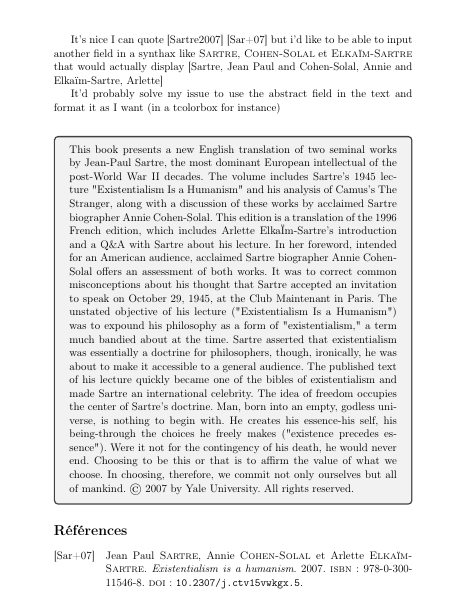JeT

**My question is in the MWE**
It's nice I can quote [Sartre2007] \cite{Sartre2007} but i'd like to be able to input/display another field available in `@book{Sartre2007}` . I'm missing the syntax since \cite[author]{Sartre2007} or \cite{author}{Sartre2007} create an error. I'd expect to have [Sartre, Jean Paul and Cohen-Solal, Annie and Elka{\"{i}}m-Sartre, Arlette] displayed.
It'd probably solve my issue to use the abstract field in the text and format it as I want (in a `tcolorbox` for instance).
It's a pity to have all this structured information and not reuse it.
I got lost reading this.
https://bibdesk.sourceforge.io/manual/BibDeskHelp_2.html

```
\documentclass[a4paper,11pt]{article}
\begin{filecontents}[overwrite]{library.bib}
@book{Sartre2007,
abstract = {This book presents a new English translation of two seminal works by Jean-Paul Sartre, the most dominant European intellectual of the post-World War II decades. The volume includes Sartre's 1945 lecture "Existentialism Is a Humanism" and his analysis of Camus's The Stranger, along with a discussion of these works by acclaimed Sartre biographer Annie Cohen-Solal. This edition is a translation of the 1996 French edition, which includes Arlette Elka{\"{I}}m-Sartre's introduction and a Q{\&}A with Sartre about his lecture. In her foreword, intended for an American audience, acclaimed Sartre biographer Annie Cohen-Solal offers an assessment of both works. It was to correct common misconceptions about his thought that Sartre accepted an invitation to speak on October 29, 1945, at the Club Maintenant in Paris. The unstated objective of his lecture ("Existentialism Is a Humanism") was to expound his philosophy as a form of "existentialism," a term much bandied about at the time. Sartre asserted that existentialism was essentially a doctrine for philosophers, though, ironically, he was about to make it accessible to a general audience. The published text of his lecture quickly became one of the bibles of existentialism and made Sartre an international celebrity. The idea of freedom occupies the center of Sartre's doctrine. Man, born into an empty, godless universe, is nothing to begin with. He creates his essence-his self, his being-through the choices he freely makes ("existence precedes essence"). Were it not for the contingency of his death, he would never end. Choosing to be this or that is to affirm the value of what we choose. In choosing, therefore, we commit not only ourselves but all of mankind. {\textcopyright} 2007 by Yale University. All rights reserved.},
author = {Sartre, Jean Paul and Cohen-Solal, Annie and Elka{\"{i}}m-Sartre, Arlette},
booktitle = {Existentialism Is a Humanism},
doi = {10.2307/j.ctv15vwkgx.5},
isbn = {9780300115468},
title = {{Existentialism is a humanism}},
year = {2007}
}
\end{filecontents}
\usepackage[french]{babel}
\usepackage[T1]{fontenc}
%\bibliographystyle{plain}
\bibliographystyle{abstract}
\begin{document}
It's nice I can quote [Sartre2007] \cite{Sartre2007} but i'd like to be able to input another field in a synthax like \cite[author]{Sartre2007} that would actually display [Sartre, Jean Paul and Cohen-Solal, Annie and Elka{\"{i}}m-Sartre, Arlette]
It'd probably solve my issue to use the abstract field in the text and format it as I want (in a tcolorbox for instance)
\bibliography{library}
\end{document}
```
Top Answer
samcarter

Don’t waste your time with `bibtex` and use `biblatex` instead. Out of the box, it has macros like `\citeauthor` and it is also much more flexible for crazy customisations nobody might have thought of yet. For example citing the abstract as `tcolorbox` can be done with only a couple of lines of code.
(The style of the citation and bibliography will be different in the example below, but things can be adjusted to whatever you like - we would just need to know the exact requirements)
```
\documentclass[a4paper,11pt]{article}
\begin{filecontents}[overwrite]{library.bib}
@book{Sartre2007,
abstract = {This book presents a new English translation of two seminal works by Jean-Paul Sartre, the most dominant European intellectual of the post-World War II decades. The volume includes Sartre's 1945 lecture "Existentialism Is a Humanism" and his analysis of Camus's The Stranger, along with a discussion of these works by acclaimed Sartre biographer Annie Cohen-Solal. This edition is a translation of the 1996 French edition, which includes Arlette Elka{\"{I}}m-Sartre's introduction and a Q{\&}A with Sartre about his lecture. In her foreword, intended for an American audience, acclaimed Sartre biographer Annie Cohen-Solal offers an assessment of both works. It was to correct common misconceptions about his thought that Sartre accepted an invitation to speak on October 29, 1945, at the Club Maintenant in Paris. The unstated objective of his lecture ("Existentialism Is a Humanism") was to expound his philosophy as a form of "existentialism," a term much bandied about at the time. Sartre asserted that existentialism was essentially a doctrine for philosophers, though, ironically, he was about to make it accessible to a general audience. The published text of his lecture quickly became one of the bibles of existentialism and made Sartre an international celebrity. The idea of freedom occupies the center of Sartre's doctrine. Man, born into an empty, godless universe, is nothing to begin with. He creates his essence-his self, his being-through the choices he freely makes ("existence precedes essence"). Were it not for the contingency of his death, he would never end. Choosing to be this or that is to affirm the value of what we choose. In choosing, therefore, we commit not only ourselves but all of mankind. {\textcopyright} 2007 by Yale University. All rights reserved.},
author = {Sartre, Jean Paul and Cohen-Solal, Annie and Elka{\"{i}}m-Sartre, Arlette},
booktitle = {Existentialism Is a Humanism},
doi = {10.2307/j.ctv15vwkgx.5},
isbn = {9780300115468},
title = {{Existentialism is a humanism}},
year = {2007}
}
\end{filecontents}
\usepackage[french]{babel}
\usepackage[T1]{fontenc}
\usepackage[style=alphabetic,maxnames=99,maxalphanames=1]{biblatex}
\addbibresource{library.bib}
\usepackage{tcolorbox}
\DeclareFieldFormat{myabstract}{%
\begin{tcolorbox}%
#1
\end{tcolorbox}%
}
\begin{document}
It's nice I can quote [Sartre2007] \cite{Sartre2007} but i'd like to be able to input another field in a synthax like
\citeauthor{Sartre2007} that would actually display [Sartre, Jean Paul and Cohen-Solal, Annie and Elka{\"{i}}m-Sartre, Arlette]
It'd probably solve my issue to use the abstract field in the text and format it as I want (in a tcolorbox for instance)
\citefield{Sartre2007}[myabstract]{abstract}
\printbibliography
\end{document}
```
